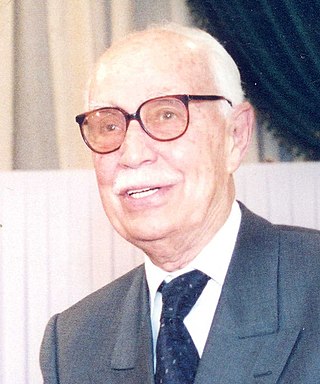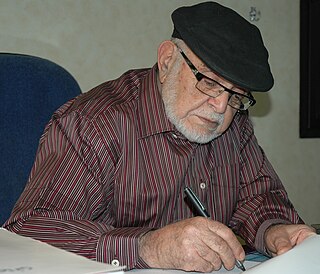Related Research Articles
Yāqūt Shihāb al-Dīn ibn-ʿAbdullāh al-Rūmī al-Ḥamawī (1179–1229) was a Muslim scholar of Byzantine Greek ancestry active during the late Abbasid period. He is known for his Mu'jam ul-Buldān, an influential work on geography containing valuable information pertaining to biography, history and literature as well as geography.
Moroccan literature is the literature produced by people who lived in or were culturally connected to Morocco and the historical states that have existed partially or entirely within the geographical area that is now Morocco. Apart from the various forms of oral literature, the written literature of Morocco encompasses various genres, including poetry, prose, theater, and nonfiction like religious literature. Moroccan literature was and is mainly written in Arabic, however it was also written at a lesser extent in Berber languages, Hebrew, French, and Spanish. Through translations into English and other languages, Moroccan literature originally written in Arabic or one of the other native languages has become accessible to readers worldwide.

Mohammed Bennis is a Moroccan poet and one of the most prominent writers of modern Arabic poetry. Since the 1970s, he has enjoyed a particular status within Arab culture. Muhsin J al-Musawi states that "Bennis’ articulations tend to validate his poetry in the first place, to encapsulate the overlapping and contestation of genres in a dialectic, that takes into account power politics whose tropes are special. As a discursive threshold between Arab East and the Moroccan West, tradition and modernity, and also a site of contestation and configuration, Muhammad Bennis' self-justifications may reveal another poetic predilection, too."
Abd al-Aziz al-Fishtali, fully Abu Faris 'Abd al-'Aziz ibn Muhammad ibn Ibrahim al-Sanhaji al-Fishtali was a Moroccan writer, head of the chancery, official historiographer and official poet of the Sultan Ahmad al-Mansur.
Shihab al-Din abu l-‘Abbas Ahmad ibn Mohammed ibn Mohammed ibn Ahmed ibn Ali ibn 'Abd ar-Rahman ibn Abi'l-'Afiyya al-Miknasi az-Zanati, known simply as Ahmad ibn al-Qadi or Ibn al-Qadi (1552/1553–1616), was a Moroccan polygraph. He was the leading writer from Ahmad al-Mansur's court in Morocco next to Abd al-Aziz al-Fishtali. He was also a renowned judge and mathematician.
Sidi Abderrahman el Majdoub, also transcribed as Mejdub, full name al-Shaykh Abu Zayd Abderrahman al-Majdoub ibn Ayyad ibn Yaacub ibn Salama ibn Khashan al-Sanhaji al-Dukkali, was a Moroccan poet, Sufi and mystic. Many lines of his poems are known throughout the Maghreb, and his work is the source of many proverbs.
Bashir Qamari was a Moroccan literary critic, novelist and playwright.

Abdelkrim Ghallab was a Moroccan political journalist, cultural commentator, and novelist. He is an important figure both in the literary and political field.

Ahmed al-Tayyeb Aldj is a well known Moroccan writer of Moroccan Arabic Zajal poetry and drama.
Ali Siqli is a Moroccan writer of children's books and drama. In 1982 he received the Great Prize of Morocco and the international King Faysal award.
Touria Sekkat was a Moroccan writer of children's books. She worked as a teacher in Casablanca.
Abu Salim 'Abd Allah ibn Mohammed ibn Abu Bakr al-'Ayyashi was a well-known travel writer, poet, lawyer, and Sufi scholar from Morocco.

Muhammad al-Rudani was a Moroccan polymath who was active as an astronomer, grammarian, jurist, logician, mathematician and poet.
George Tarabishi was a Syrian writer, philosopher, and translator. He translated over 200 books into Arabic, including works by Hegel, Freud, Sartre and Simone de Beauvoir.

Charbel Dagher is a Lebanese professor at the University of Balamand, Koura, Lebanon. He has been an active and prominent voice on the Arab cultural scene, mainly in the fields of poetry, Arabic language, and Arab and Islamic arts. He is a Poet, writer and story-writer in both Arabic and French.

Ma'ruf bin Abdul Ghani al Rusafi (1875–1945) was a poet, educationist and literary scholar from Iraq. He is considered by many as a controversial figure in modern Iraqi literature due to his advocacy of freedom and opposition to imperialism and is known as a poet of freedom.
Taissier Ahmad Khalaf, , is a Syrian-Palestinian novelist, critic and researcher. He has written over 30 books including the 2017 International Prize for Arabic Fiction nominee novel The Slaughter of the Philosophers.
'Abd al-Qadir ibn 'Umar al-Baghdadi was an author, philologist, grammarian, magistrate, bibliophile and a leading literary encyclopedist of the Ottoman era.

Mohamed Hajji was a Moroccan historian, encyclopaedist, writer, scholar and a university professor. The author of some forty books, he is particularly famous for his encyclopedia Ma'lamat al-Maghrib, the work of his life.